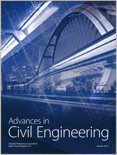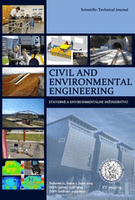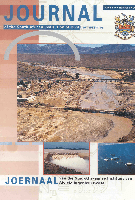
Infrastructures
Scope & Guideline
Transforming Ideas into Infrastructure Innovations
Introduction
Aims and Scopes
- Sustainable Infrastructure Development:
Research aimed at enhancing the sustainability of infrastructure projects through innovative materials, recycling practices, and eco-friendly construction methods. - Advanced Materials and Technologies:
Exploration of new materials, such as recycled aggregates, geopolymers, and smart materials, for improving the performance and durability of infrastructure. - Structural Health Monitoring and Safety:
Studies focused on the monitoring, assessment, and enhancement of the safety and resilience of infrastructure systems using advanced technologies such as IoT, machine learning, and data analytics. - Transportation Systems and Management:
Research addressing the efficiency and safety of transportation systems, including road, rail, and air transport, with a focus on traffic management and user behavior. - Climate Resilience and Risk Management:
Investigations into the impacts of climate change on infrastructure and the development of strategies for risk assessment and management to enhance resilience. - Urban Planning and Smart Cities:
Studies that integrate urban infrastructure planning with smart technologies and sustainability principles to foster the development of smart cities.
Trending and Emerging
- Integration of AI and Machine Learning:
An increasing number of studies are focusing on the application of artificial intelligence and machine learning techniques for predictive modeling, data analysis, and infrastructure monitoring. - Sustainable and Circular Economy Practices:
Research emphasizing the principles of sustainability and the circular economy, particularly in construction materials and waste management, is on the rise. - Smart Infrastructure and IoT Solutions:
A growing trend in exploring the integration of Internet of Things (IoT) technologies for real-time monitoring and management of infrastructure systems. - Resilience and Climate Adaptation Strategies:
Emerging themes relate to enhancing infrastructure resilience to climate change impacts, including risk assessment methodologies and adaptive management strategies. - Digital Twin Technologies:
An increasing focus on the use of digital twins for infrastructure management and monitoring, enabling real-time data integration and decision-making. - Multimodal Transportation Systems:
Research on the integration of various modes of transportation, including the use of electric and autonomous vehicles, is gaining traction.
Declining or Waning
- Traditional Materials in Infrastructure:
Research on conventional materials like standard concrete and asphalt has decreased as the focus shifts toward sustainable and innovative materials, such as recycled and geopolymer options. - Static Analysis Techniques:
There is a waning interest in purely static analysis methods for assessing infrastructure, with a move towards dynamic and probabilistic approaches that take into account real-world variability. - Historical Infrastructure Studies:
The frequency of studies focused on historical infrastructure preservation has diminished, possibly as attention turns to modern challenges and technologies. - Conventional Traffic Management Systems:
Research addressing traditional traffic management systems is less prevalent, with a growing emphasis on smart technologies and data-driven approaches for traffic optimization. - Local Case Studies without Broader Implications:
There is a decline in the publication of localized case studies that do not offer insights or applications to broader infrastructure challenges or innovations.
Similar Journals

Advances in Civil Engineering
Fostering Collaboration for a Resilient WorldAdvances in Civil Engineering is a leading peer-reviewed journal published by HINDAWI LTD, dedicated to advancing knowledge and innovation in the field of civil and structural engineering. Holding an esteemed Q2 ranking in the 2023 category for Civil and Structural Engineering, this journal serves as a vital platform for disseminating cutting-edge research and practical applications that address contemporary challenges in infrastructure development, sustainable design, and material science. Launched in 2008 and operating as an Open Access journal since 2009, it promotes the free exchange of ideas by ensuring that all articles are accessible to researchers, professionals, and students globally. The journal is also indexed in Scopus, ranking at #142 out of 379 in its category, situating it within the 62nd percentile of its peers. With a focus on interdisciplinary collaboration and innovative solutions, Advances in Civil Engineering contributes significantly to the ongoing evolution of engineering practices and education, making it an essential resource for anyone involved in or studying the ever-evolving field of civil engineering.

Civil Engineering Journal-Tehran
Pioneering Research in Civil Engineering and Construction Excellence.Civil Engineering Journal-Tehran is a premier academic publication focusing on the dynamic fields of civil engineering, construction, and environmental science. Published by C EJ PUBLISHING GROUP, this journal has garnered significant recognition, reflected in its impressive quartile rankings—ranking Q1 in Building and Construction and Civil and Structural Engineering, and Q2 in Environmental and Geotechnical Engineering. With its ISSN 2676-6957 and E-ISSN 2476-3055, this journal serves as a crucial platform for disseminating innovative research and advancements from 2019 through 2024. Notably situated at K N Toosi University of Technology in Tehran, Iran, it emphasizes both local and global perspectives on civil engineering challenges. Aiming to foster scholarly discourse, the journal is essential for researchers, students, and professionals dedicated to the evolution and sustainability of civil engineering practices.

Engineering Reports
Fostering innovation in engineering with open-access insights.Engineering Reports is a premier open-access journal published by Wiley, dedicated to advancing the fields of Engineering and Computer Science. Since its inception in 2019, this journal has rapidly gained recognition, achieving a commendable Q2 ranking in both the engineering and computer science categories in 2023, evidencing its impactful contributions to the scientific community. With an impressive Scopus rank of #70/307 in General Engineering and #63/232 in General Computer Science, the journal is well-positioned to disseminate cutting-edge research and foster innovation. Researchers, professionals, and students will find value in its comprehensive scope, which includes emerging technologies and interdisciplinary studies, making it an essential resource for anyone involved in these dynamic fields. Accessible online, Engineering Reports aims to bridge the gap between complex engineering theories and practical applications, enhancing collaboration and knowledge sharing globally.

Innovative Infrastructure Solutions
Leading the Charge in Sustainable Engineering Practices.Innovative Infrastructure Solutions is a leading academic journal published by Springer International Publishing AG, focusing on pioneering advancements in the fields of building and construction, civil and structural engineering, and environmental engineering. With an impact factor that reflects its significant role in the academic community, this journal serves as a vital platform for researchers, professionals, and students to disseminate groundbreaking studies and novel methodologies spanning diverse engineering disciplines. Since its inception in 2016, Innovative Infrastructure Solutions has steadily positioned itself within the Q2 category across several fields, including geotechnical engineering and engineering geology, as recognized in the 2023 quartiles. This reputable journal, accessible from Switzerland, not only emphasizes collaboration and knowledge exchange but also empowers innovators in infrastructure development globally. Whether you're contributing to a research project or seeking the latest findings, Innovative Infrastructure Solutions remains essential for anyone invested in advancing sustainable infrastructure solutions.

Gradevinar
Pioneering Developments in Civil and Structural EngineeringGradevinar, published by the Croatian Society of Civil Engineers-HSGI, is a leading Open Access journal in the field of Civil and Structural Engineering, with a significant history that dates back to its inception in 1980. This journal, with the ISSN 0350-2465 and E-ISSN 1333-9095, has established itself as a vital platform for disseminating innovative research and practical developments in civil engineering, particularly since it became Open Access in 2000, facilitating unrestricted access to its wealth of knowledge. As of 2023, Gradevinar is ranked in the third quartile (Q3) of Scopus’s Civil and Structural Engineering category, demonstrating its growing influence and relevance in the academic community, with a current ranking of #255 out of 379 journals in the field. Researchers, professionals, and students benefit from this journal's commitment to high-quality content that reflects the latest advancements and best practices in civil engineering, contributing to both technical proficiency and sustainable development in infrastructure projects across Croatia and beyond.

Civil and Environmental Engineering
Innovating solutions for a resilient environment.Civil and Environmental Engineering, published by SCIENDO, is a prominent open-access journal dedicated to advancing research and knowledge in the fields of civil and structural engineering, as well as environmental engineering. Since its inception in Germany, it has been committed to promoting cutting-edge studies and methodologies that address the pressing challenges in these domains. With an ISSN of 1336-5835 and E-ISSN of 2199-6512, the journal is accessible to a global audience, having adopted an open-access policy since 2014 to enhance the visibility and dissemination of scholarly work. The journal currently holds a Q3 ranking in both Civil and Structural Engineering and Environmental Engineering, as of 2023, reflecting its growing influence within the academic community. It operates within a framework of rigorous peer-review standards and encourages contributions that not only contribute to theoretical advancements but also have practical implications for real-world applications. Researchers, professionals, and students alike will find invaluable insights and innovative perspectives in the latest studies published from 2018 to 2024.

Journal of Transportation Engineering Part A-Systems
Advancing Transportation Systems Through Innovative ResearchThe Journal of Transportation Engineering Part A-Systems, published by the American Society of Civil Engineers (ASCE), is a cutting-edge, peer-reviewed journal dedicated to the advancement of knowledge in the field of transportation systems. With an ISSN of 2473-2907 and an E-ISSN of 2473-2893, this journal serves as a crucial resource for researchers, professionals, and students interested in the intricate interplay between civil engineering and transportation networks. Boasting a Q2 ranking in both the Civil and Structural Engineering and Transportation categories, this journal reflects the high-quality research contributing to these vital disciplines. Accessible through open-access options, the journal provides a platform for innovative ideas and research findings from 2017 to 2024, aiming to address contemporary challenges in transportation systems while fostering interdisciplinary collaboration. As an essential outlet for scholarly work in the United States and beyond, the Journal of Transportation Engineering Part A-Systems is committed to enhancing the understanding of complex transportation dynamics and the development of sustainable and efficient infrastructures.

CANADIAN JOURNAL OF CIVIL ENGINEERING
Shaping Tomorrow's Infrastructure with Today’s DiscoveriesCanadian Journal of Civil Engineering, published by Canadian Science Publishing, serves as a premier platform for the dissemination of innovative research and development in the fields of civil and structural engineering, as well as environmental science. Established in 1971, this journal maintains a robust reputation, achieving a Q3 ranking in both civil engineering and general environmental science categories as of 2023. While it does not currently offer open access, the journal is accessible to a wide audience of researchers, professionals, and students who are keen to stay abreast of the latest advancements in civil engineering practices. With a significant number of yearly publications and a committed editorial board, the Canadian Journal of Civil Engineering contributes to the foundational knowledge and practical applications in the engineering community, thereby playing a critical role in addressing contemporary challenges in civil infrastructure and environmental sustainability.

Journal of the South African Institution of Civil Engineering
Empowering engineers with cutting-edge research.Journal of the South African Institution of Civil Engineering (ISSN: 1021-2019) is a distinguished open-access publication dedicated to advancing the field of civil engineering in South Africa and beyond. Established by the South African Institution of Civil Engineering (SAICE) and South African Institute of Steel Construction (SAISI), it serves as a critical platform for sharing research, case studies, and industry developments. The journal has been openly accessible since 2015, ensuring broader dissemination of knowledge among researchers, professionals, and students alike. Although it currently holds a Q4 ranking in Civil and Structural Engineering and is positioned within the lower percentiles in Scopus rankings, its commitment to fostering growth in the engineering sector remains strong. Covering various topics from structural design to innovative construction methodologies, the journal invites contributions that push the boundaries of current practices and methodologies. This publication is essential for those invested in sustainable engineering solutions, aiming to collaborate and contribute towards the evolution of civil engineering standards in South Africa.

Teknik Dergi
Unlocking Potential in Building and Construction FieldsTeknik Dergi is a key academic journal published by the Turkish Chamber of Civil Engineers, focusing on the critical fields of Building and Construction as well as Civil and Structural Engineering. Established in Turkey, this journal serves as a vital platform for researchers, practitioners, and students to disseminate innovative findings and advancements within these disciplines. Although its coverage in databases like Scopus has been discontinued since 2022, Teknik Dergi remains a respected resource for its historical contributions, with a record of publication spanning from 1990 to 1998 and then from 2002 to 2022. The journal currently holds a Q4 categorization in both its primary fields, ranking within the 30th and 25th percentiles respectively. Authors and readers can access articles exploring practical applications and theoretical foundations, making it a valuable asset for those engaged in the rapidly evolving landscape of civil engineering. Open Access options are also available, allowing for broader dissemination and engagement with its published work.